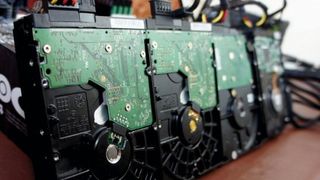So with that old system cleaned, washed and paid for it's time to put it to good use. Here are ten of our top reuses for an old system - you might think many can work on the same system, which is true. It's simply down to you to implement them in the way that suites you best.
Destroy the evidence
Out, Damn'd spot! Out, I say!

Planning on passing on an old system? You'll need to take basic data protection measures then. To kick things off wipe your hard drive, it'll contain all sorts of juicy bits of data about you. Just deleting the files isn't enough as this only removes the file pointer from the file system tables, leaving the actual data on the drive. There is an urban myth that you need to wipe a drive multiple times to safely erase data, this is nonsense, a single wipe is fine.
The old 35-times myth came from a 1996 paper by Peter Gutmann that wasn't referring to modern drives, but 30-year-old storage systems. In fact, in a follow-up paper he says two passes would be more than enough. Wipe all the shipping drives using something like Parted Magic - this boots from an optical disc and will safely wipe all attached internal drives.
Owners of SSDs shouldn't use standard disk wiping tools, you need to use a specific secure erase command - Parted Magic supports this. If you're really paranoid about data security on old drives, we'd suggest you invest in a heavy-duty drill or pair of bolt cutters.
Flog it
Get hard cash for recycled systems
We spoke to John Frost at www.uk-computer-recycling.co.uk about how you can sell your old PC kit for cash and what happens to it once it enters their secure premises.
Get daily insight, inspiration and deals in your inbox
Get the hottest deals available in your inbox plus news, reviews, opinion, analysis and more from the TechRadar team.
So what does your company actually do?
Our business collects and recycles all IT related equipment throughout the entire UK. We have also established a laptop-recycling scheme for households, allowing the general public to exchange their old laptops for cash. We process 1,500 to 2,000 PCs and laptops per month.
What type of systems do you see the most of?
We see a fluctuation of specifications every three years once businesses upgrade their equipment. Around 2011/12 was the end of the Pentium 3/4 era and we are now beginning to see the influx of dual-core systems. Around 90 per cent of these systems are Dell and HP.
What's the easiest and hardest parts that you deal with?
I have to be honest and say that the IT recycling field isn't easy to get into due to the amount of red tape involved regarding our responsibility to the environment. It's always interesting and satisfying to see pallets of absolute junk turned back into base materials, such as precious metals, and reused again.
What percentage of systems do you manage to salvage and reuse?
I am very proud that our company is able to salvage around 80 to 90 per cent of all the equipment that passes through our facility. Only a small percentage of equipment is forwarded for dismantling and an even smaller amount will ever reach landfill.
Any tips for people trying to salvage their own systems?
My best advice would definitely be reuse over recycling - can it be reused around the house or do you know someone that may have use for it? A simple RAM upgrade can greatly increase performance and prolong its lifespan.
Gassing on about gasses
PCs are horrible for the environment
We're going to say they're as bad as a car - we have no evidence to back this up, but stay with us.
When it comes to its carbon footprint, it's been shown that you're better off running an older car for longer than scrapping it and buying a new more efficient one. Even when you take into account saving through recycling, an old car can be run for as much as a decade, before its inefficiencies outweigh its production and ongoing carbon use.
Most Popular

